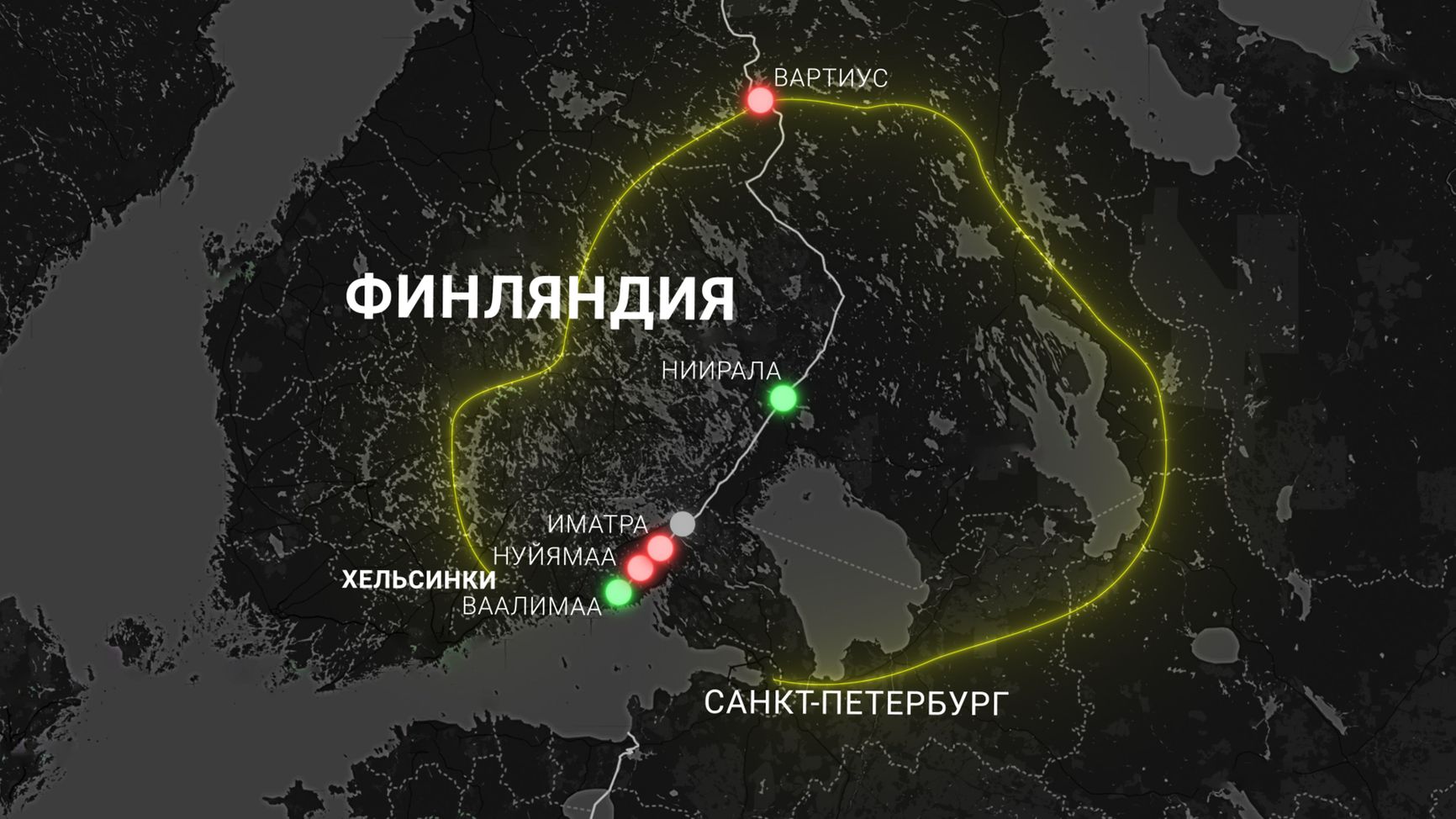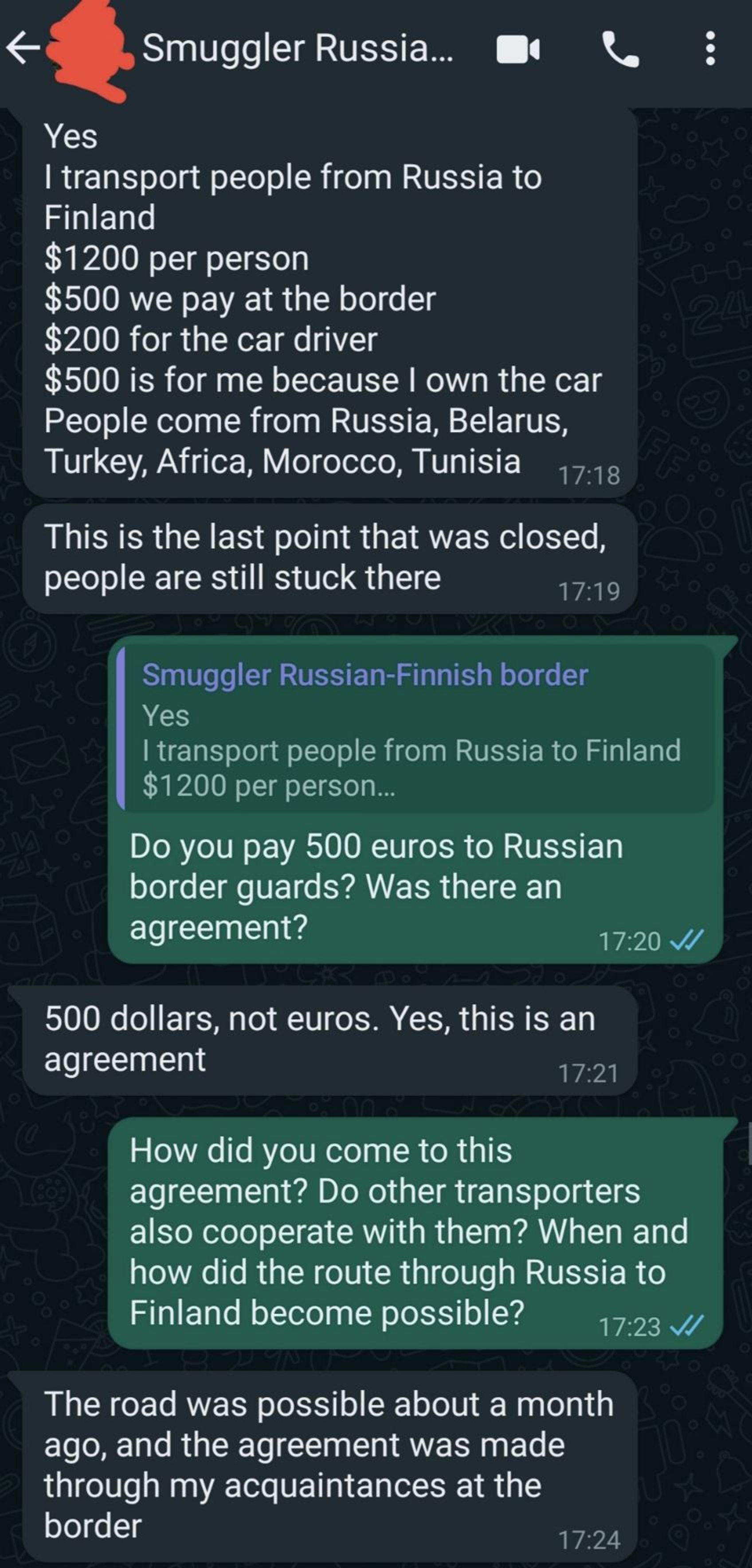

Over the last two months, Arab migrants have overwhelmed border crossings between Russia and Finland. Much like the scenario at the Polish-Belarusian border, these migrants are brought to the border in organized groups, and Russian border guards then provide them with bicycles. The situation prompted the Finns to temporarily close the border crossings. Although they planned to resume operations on December 14, the influx of migrants persisted, leading to another closure. In discussions with migrants and their helpers, The Insider uncovered that the surge of refugees isn't just happening with knowledge but is entirely under the control of Russian security forces. Furthermore, there is confirmation that the crisis at the Finnish border is orchestrated by the same entities responsible for the crisis on the Poland-Belarus border.
Content
Cycling into Finland
From Belarus to the Finnish border
Recruitment in Damascus
Police meet and greet
Migrant smuggling
Cycling into Finland
The first reports of attempts by Arab migrants to cross the Russian-Finnish border without Schengen visas emerged in early November. They arrived at the border crossings by taxi or in groups. As the migrants themselves reported in Arabic chat groups, Russian border guards provided them with bicycles and allowed them through the Russian border checkpoint without Schengen visas, enabling them to reach the Finnish side and seek asylum.

By mid-November, the number of migrants had already reached the hundreds. Initially, Finnish authorities attempted to impose restrictions on bicycle border crossings. When this proved unsuccessful, they started closing one border checkpoint after another, up to the northernmost one, Raya-Yooseppi, located 240 km from Murmansk and almost a thousand kilometers from St. Petersburg. Despite the approaching cold weather, Arab migrants managed to reach even this border crossing.

It turned out that the authorities in Murmansk organized buses, transporting Arab refugees from already closed checkpoints to still open ones, set up tents, and assisted with hot meals. Governor of the Murmansk region, Andrey Chibis, explained in his Telegram channel, “A humanitarian crisis has developed at the Salla border crossing with Finland. The NATO country is artificially creating a backlog.” As a result, on November 30, Finland decided to completely close all border crossings until December 14.

However, when the border reopened two weeks later, the situation repeated itself. Dozens of Arab refugees on bicycles once again appeared at the open border crossings of Vaalimaa and Niirala. Consequently, Finnish authorities, in less than a day, decided to close all border crossings again, this time until January 14.
From Belarus to the Finnish border
According to Finnish customs officials, nearly fifteen hundred Arab migrants have managed to cross the Russian-Finnish border since early November and seek asylum in the European Union. They are currently in Finland, awaiting the processing of their cases. Most of them are from the Middle East - refugees from Syria, Iraq, Yemen, Somalia, and even Ethiopia and Egypt. All of them came to Russia to try various means to enter Europe. Previously, until November, they had planned to enter the EU through a completely illegal and highly dangerous route through the forests on the border between Belarus and Poland.
However, as revealed by The Insider, in November, information began circulating in Arab forums and groups on Facebook, where Belarus was recently advertised, stating that a new route had opened for refugees directly from Russia to Finland. Moreover, the migrants who successfully crossed the border started sharing success stories on their pages and accounts. For instance, a certain Ali Alhamzami from Iraq did so. On November 9, he flew to Moscow directly from the United Arab Emirates, crossed the Finnish border on November 14, and is now residing in the city of Lieksa. He documents his journey on TikTok.
In these groups, phone numbers of individuals offering assistance for a fee in obtaining documents in Russia and reaching the Finnish border were shared. Under the guise of a Syrian refugee, The Insider correspondent contacted one of them - a person identified in Cyrillic as Mukha on Telegram.

Mukha confirmed that he is indeed willing to help with visa processing and can even provide a business invitation from Russia. However, his services come at a significant cost - $3800 if half the amount is paid upfront, or $4200 if the entire sum is paid upon arrival in Russia. The money must be transferred in advance to the account of a guarantor company in Turkey.
Another dealer contacted by The Insider proposed arranging a Russian visa through a business invitation for $5000. The visa itself would supposedly take two months to process, a timeframe allegedly set by Russian consulates, according to the dealer.
Recruitment in Damascus
Before the closure of the Finnish border crossings, migrants actively recommended obtaining student visas for studies in Russia in online forums and groups. The cost of these visas was only $1,500, and dealers promised guaranteed enrollment in Russian universities. The Insider managed to speak with one of the students from Syria, Musa (name changed), who successfully obtained a student visa. He shared that Russian universities accept Arab applicants based on the average score of their school certificate, and some even without knowledge of the Russian language. Although Musa did not use intermediaries, it turned out that he was assisted in obtaining the visa by the Russian Cultural Center in Damascus. Indeed, the RCC's Telegram channel regularly posts announcements about enrolling foreign students in Russian universities. However, Musa chose not to pursue studies in Russia; on December 14, he headed to the Finnish border and sought asylum.
Currently, dealers claim that the issuance of student visas for citizens of Syria, Iraq, Yemen, and Egypt has been temporarily suspended officially due to certain procedural changes. However, instead of student visas, sports visas are now actively advertised on Arab forums.
Police meet and greet
In November, Russian security forces decided to redirect the flow of migrants from Belarus to the Finnish border, as revealed by one of the smugglers, Abdullah (name changed), to The Insider. According to Abdullah, he and his colleagues used to earn their living by transporting refugees to the Polish border in Belarus. However, in early November, “Russian officers” contacted him. “Russia started allowing migrants in about a month and a half ago, and we found out about it through the officers we have connections with,” says Abdullah.

Smugglers also set their price list for crossing the border. According to Abdullah, migrants pay $1200: $500 is given to the Russian border guard, and $200 to the driver of the vehicle. “I only take people to the border; after that, Russian border guards take care of them — they provide them with bicycles to cross the border into Finland,” Abdullah explains.
The connections with law enforcement are also mentioned by a document dealer, Mukha. According to him, control over migrant traffic begins at the airport when refugees arrive in Russia. A “certain colonel” greets them and helps them cross the border.
When refugees arrive in Russia, a “certain colonel” greets them and helps them cross the border
Now, with the Finnish border closed, smugglers and dealers are once again offering all refugees to travel to Belarus, where they will drop them in the woods near the Polish border and indicate the approximate direction they need to walk for dozens of kilometers.
According to political analysts, what is happening at the Finnish border is considered by some as Finland's retaliation for joining NATO. The same version is supported within the North Atlantic Alliance itself. “It's the same as what we saw on the border with Belarus [in 2021]. We believe this is another example of Russia using migration as a tool of pressure on European countries,” said Jens Stoltenberg in November.
Migrant smuggling
While the Russian security forces assist the Kremlin in achieving its political goals, savvy Russian entrepreneurs are making money from this situation. Among them are Sergey Merzlyakov and Khalid Elameri, founders of the project Made in Russia24. In this business, they have been bringing a considerable number of foreign citizens from Arab and African countries to Russia (and through Russia to the EU) for several years. It all started in Perm, where Sergey Merzlyakov began offering services for obtaining invitations and helped foreigners enter Russia through the company Ural-Wood LLC, which was involved in the production and export of sawn timber. The company had branches in Iraq and the Sultanate of Oman and had active business relationships with companies in Arab countries (currently, the company is part of the Lestech association).
They assisted citizens of various Arab countries in coming to Russia and legalizing their stay in the country through various means — initially often for educational reasons, particularly enrolling in Perm Polytechnic, where Sergey Merzlyakov was acquainted with Professor Vladimir Pervadchuk. Invitations were also processed for tourism, using various local hotels and travel agencies. Over time, methods expanded, and the numbers of those staying increased. Since the beginning of 2019, Sergey and Khalid actively started producing video content and developing their social media presence. In April 2020, Sergey came up with a new method to draw in bridegrooms from Eastern countries, and soon was joined by Roman Vederikov, who created the Russian-Arab dating site Rusmarry.
In 2019, RT produced a complimentary segment about them, which they were quick to boast about. When, in 2021, migrants began storming Poland from Belarus, their channel gained attention in a DW article. In late March 2021, Sergey Merzlyakov released a video explaining that it is the perfect time for whole families to come, everything has been prepared for it, and he also explained how to leave Belarus quickly. In the summer of 2021, the founders of Made in Russia24, through their YouTube channel run by Khalid, explained how to proceed despite the difficulties and restrictions on the borders between Belarus and the EU.
Based on available video materials, The Insider has determined that the smuggling scheme operates as follows: the client sends a scan of their passport and proof of residence in their country, selects a hotel, receives an invitation to Belarus via email, purchases a round-trip ticket to Belarus, undergoes a COVID-19 test, arrives without a visa at Minsk airport, is met by a Made in Russia24 manager who provides insurance, and then they proceed to the consul right at the airport, where the client obtains the visa. In the spring of 2023, Merzlyakov also launched the Study in Russia24 project, promising registration in accredited universities within 24 hours (providing a comprehensive package inclusive of services ranging from airport reception to medical assistance).
Publicly, the smugglers do not explicitly disclose their involvement in the FSB's schemes to redirect migrant flows to Poland and Finland, but for those wishing to avail themselves of these services, it is evident without additional explanations. For instance, after the opening of the border with Finland on December 14, 2023, Sergey Merzlyakov's and Khalid Elameri's channels shared a video where Khalid personally welcomed citizens of Syria at Sheremetyevo Airport and accompanied them to the medical examination.
This article is written in association with Alexei Remizov.